“We never give up on our patients. We are proud of our mission, which is to serve the most vulnerable.”
Your donation can help Dr. Clermont and our entire staff care for more patients than ever before.
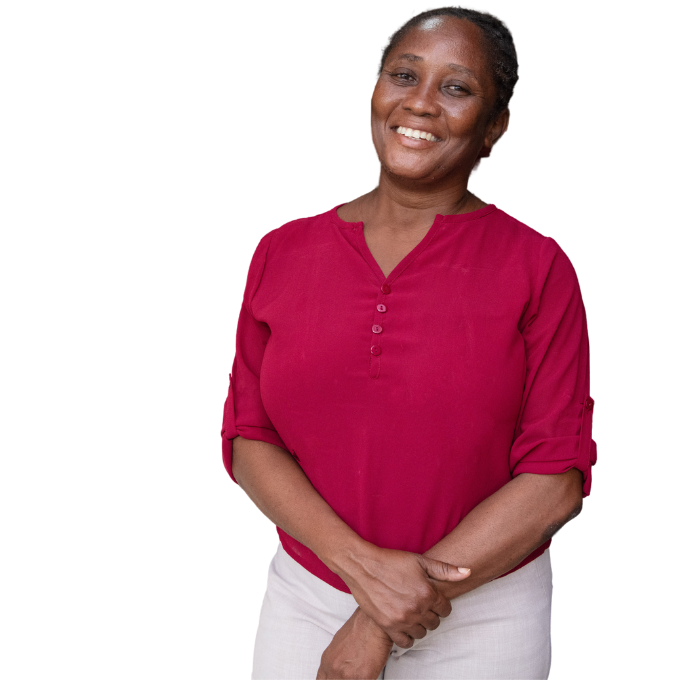
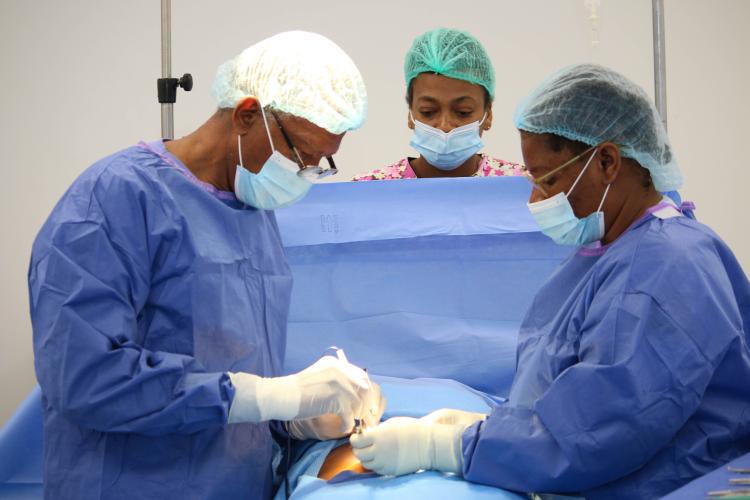
Dr. Télémaque (left) leads Hernia Help’s work in Haiti.
Last year Kemler Fred, a 52-year-old carpenter from Petit Trou de Nippes, noticed a ball-shaped lump rising in the area of his upper thigh. He sought help at the nearest health center, but they were unable to treat him. “I had to come to [SBH] because it was starting to bother me. I couldn’t work or eat well,” he says. “There, they took good care of me. The doctor told me there was a group of people coming to do hernia operations.” Kemler Fred returned as instructed for the operation he needed in August. While many younger patients with simpler hernias can be released in just a couple hours, Kemler Fred spent two days at the hospital before he had recovered enough to travel home.
St. Boniface Hospital routinely performs 15-20 hernia surgeries per month under the direction of our Chief of Surgery, Dr. Pierre Abdias Jules. Yet he’s always seeking to provide high-quality care to as many people as possible, and for that, our partnership with Hernia Help is invaluable. Hernia Help began working in Haiti in 2014, initially organizing international surgical service trips while also working to build local capacity. Their mission is “to deliver expertise, service, and compassion to improve the quality of life for hernia patients in the developing world.”
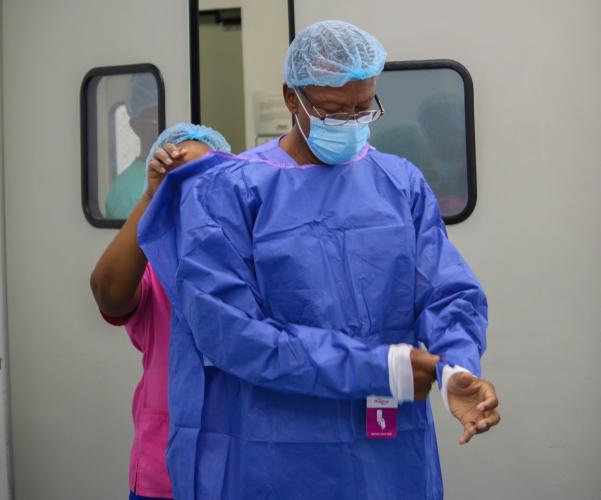
Dr. Télémaque preparing for surgery.
Now Haiti’s Hernia Help program is led by Dr. Louis-Franck Télémaque, former Chief of Surgery at the State University of Haiti Hospital (Hôpital de l’Université d’Etat d’Haïti, HUEH). He explains, “The program provides free surgical care for all patients suffering from inguinal, femoral, lateral, or incisional hernias or eventration.” Dr. Télémaque and his team travel to hospitals all around the country – including SBH. They spend about a week in each location, operating on as many as 40-50 patients, supporting the host hospital with surgical supplies, and training local staff as needed.
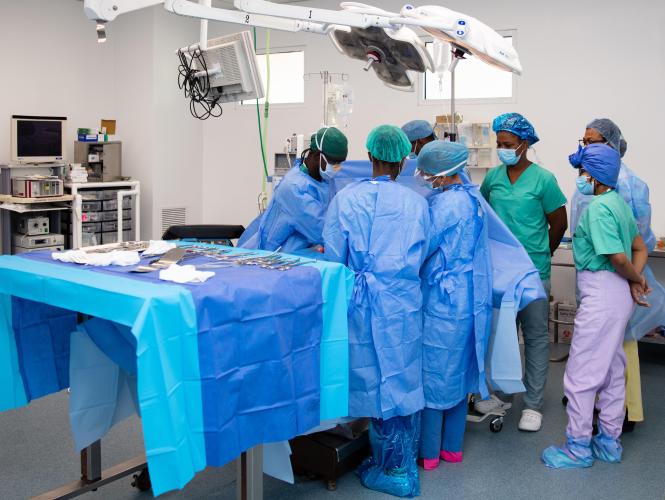
© Nadia Todres
SBH provides training in a wide variety of surgical procedures, educating the next generation of medical professionals.
Dr. Jules says that hernias are a common problem and it’s efficient to focus on hernia surgeries for a week at a time, 3-4 times per year. He also appreciates the opportunity Hernia Help missions provide for his surgical residents to increase their expertise in this area. Hernia Help teaches them a method of tension-free hernia repair, in which a synthetic mesh is placed over the hernia opening. The mesh serves as lightweight scaffolding into which new tissue can grow, resulting in permanent closure of the hernia and rapid recovery for the patient.
The transition from international to Haitian-led surgical teams was accelerated by COVID-19 travel restrictions, and studied by seven physicians, including Dr. Télémaque, Dr. Jules, and Dr. Michelson Padovany (former SBH Chief of Surgery). They found that switching to Haitian-led teams allowed Hernia Help to reach twice as many patients per year at a much lower per-patient cost, and their research was awarded Best Presentation at the American Hernia Society annual meeting in 2022.
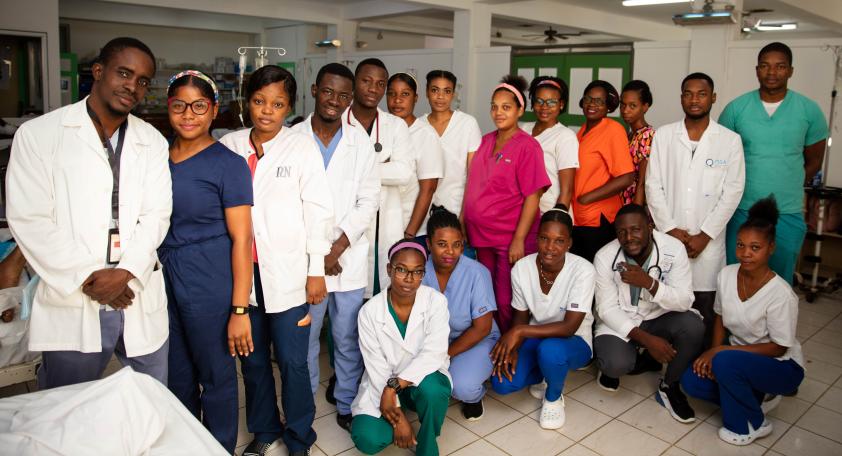
© Nadia Todres
Dr. Jules (left) with the staff of SBH’s surgical department in the post-op ward, March 2023.
Travel within Haiti has now become extremely difficult for everyone due to gang violence, blocked roads, fuel shortages, and the threat of kidnapping. Nonetheless, Dr. Télémaque and his team were able to make it to SBH in both August and December. “St. Boniface Hospital provides extremely good opportunities,” he says. “Not only are there supplies for the patients, but the staff are highly trained, the surgeons are very competent, the nurses are very competent and very experienced. Therefore, we go quickly, and, generally, at the end of the program, there are no patients who have any complications.”
Serving patients in Haiti, especially the poorest and most vulnerable patients, demands a high degree of flexibility from the surgical team. Sometimes a patient skips their pre-operative appointment. “But you can’t send the patient away. You just have to go ahead and operate on him,” says Dr. Télémaque. He adds that despite technical and logistical challenges, “we’ve succeeded in all of our operations. We confronted all of the difficulties that we found, and the patients are satisfied.”
My experience at the hospital during those two days has caused me to talk about the hospital everywhere I go because of the way the doctors and nurses cared for me.
Kemler Fred
One of those satisfied patients is Kemler Fred. He tells us, “After getting my operation, I felt well again. I hadn’t been able to do some things, and I hadn’t been able to work, but now I am back to all of my activities. I’m happy that this program provides free care because a hernia is a serious condition and I wouldn’t have been able to pay for this quality of care. My experience at the hospital during those two days has caused me to talk about the hospital everywhere I go because of the way the doctors and nurses cared for me.”
Your donation can help Dr. Clermont and our entire staff care for more patients than ever before.
